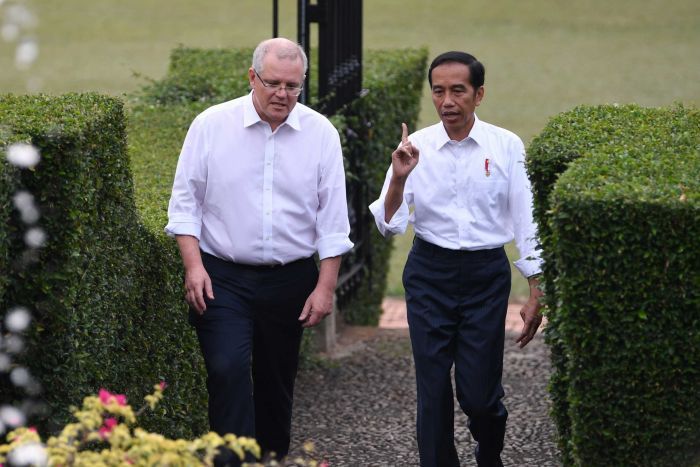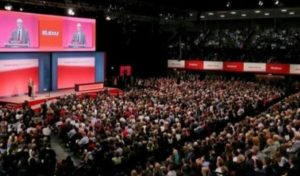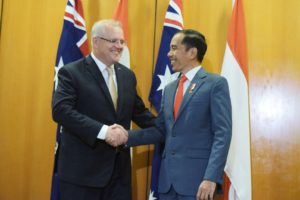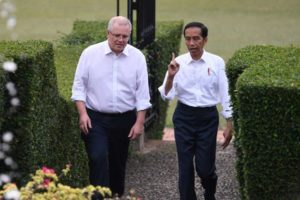Canberra, MINA — Australia’s suggestion that it might move its embassy in Israel from Tel Aviv to Jerusalem has upset Indonesia, The Conversation reported.
Indonesia is not happy with Australia’s proposal as it indicates strong political support for Israel. Indonesia, the world’s biggest Muslim country, has long expressed solidarity with the Palestinians in their conflict with Israel.
Also Read: Pakistan Condemns Israeli Settler Attacks in West Bank, Al-Aqsa Storming
Indonesian Foreign Minister Retno Marsudi has warned Australia that the move would harm their bilateral relationship.
Despite the tensions between Canberra and Jakarta, Australia Prime Minister Scott Morrison said the Jerusalem issue would not affect the ongoing discussion on the Indonesia-Australia Comprehensive Economic Partnership Agreement (IA-CEPA).
However, as Indonesia is nearing general and presidential elections next year, suspension of the IA-CEPA deal is still possible as religion has become a hot commodity for politicians to win votes.
A delay will not only create a loss for the Australian and Indonesian economies but will also change foreign policy dynamics between the two countries.
Also Read: China Criticizes US-Drafted UN Gaza Resolution as Vague, Abstains from Vote
Suspension is still possible
During Morrison’s recent visit to Jakarta, Australia and Indonesia reached an agreement to finalise IA-CEPA. However, this agreement is not yet sealed and is still waiting for completion of the full-text draft.
So, things still can change should Australia follow through with it Jerusalem plan at the height of elections in Indonesia next year.
Also Read: Former Bangladesh PM Sheikh Hasina Sentenced to Death
In recent years, Indonesian politicians have used religion to lure voters. Before he was elected in 2014, President Joko “Jokowi” Widodo promoted pluralism in his campaign. He had to endure campaigns by his opponent Prabowo Subianto that painted him as un-Islamic. Jokowi narrowly won the election.
From this experience, Jokowi, seeking re-election in another race with Prabowo, now uses the Islam card to win voters.
Jokowi has named hard-line Muslim cleric Ma’ruf Amin as his running mate to gain votes from Muslim conservatives. It’s possible that Jokowi will hold up the trade deal in response to Australia’s Jerusalem plan to appease these voters.
In his 2014 presidential campaign, Joko Widodo declared his full support for Palestinian freedom.
Also Read: Pakistan Declares State of War After Car Bomb Incident
Economic losses – reversing progress
Indonesia and Australia will miss out on many economic opportunities should the deal be put on hold.
Under the IA-CEPA, Indonesia will enjoy 0% tariffs for all export commodities. These include automotive products, herbicides, pesticides, electronic equipment, machinery, rubber, wood, coffee, chocolate and paper. The removal of several tariff barriers will also allow Indonesia to expand palm oil exports.
Also Read: Jakarta Hosts Gala Dinner for World Peace Forum Delegates
For Australia, this agreement will enhance its steel and agricultural exports to Indonesia. It will also allow Australian universities to establish branches in Indonesia.
This is a good opportunity for these universities to unlock the benefits of extending their market to Australia’s closest neighbour. This investment opportunity will also enable Indonesia to improve its education system.
Trade as a foreign policy tool
Also Read: Indonesian Minister Urges Synergy Between Wasathiyah Islam and Chinese Wisdom
Suspension of the IA-CEPA deal would impact relations between Australia and Indonesia beyond economic issues.
Australia might have seen the IA-CEPA deal only in economic terms. But the Jerusalem case has shown that the trade deal is also related to both countries’ overall foreign policy.
In these circumstances, the Jerusalem brouhaha may give Indonesia leverage to enhance its bargaining position in its deal. If necessary, Indonesia can revisit the list of its sensitive sectors to ensure Australian exports will not harm Indonesia’s import-competing industries. Investment in higher education can also be reassessed to get a fairer go, given recent opposition from Indonesian private universities.
Indonesia also may include a wider agenda – for example, support for Palestine – in the trade negotiation. It’s common to put non-economic agendas into free trade negotiations. For example, the European Union recently refused trade deals with countries that do not ratify the Paris Accord. The United States is facing calls to raise concerns about human rights violations in China in negotiations on a free trade deal with China.
Also Read: New Delhi Covered in Toxic Smog: Residents Say ‘We Can Hardly Breathe’
The future relations
The bilateral relationship between Australia and Indonesia depends on who holds power in Australia. In the past, people assumed that under Labor Party governments Australia would be a nicer neighbour than when governed by Liberal-National Coalition governments.
This is due to Australian governments’ historical Anglophile policy that supports the interest of Western countries and undermines regional engagement. This stereotype of the Liberal Party has weakened over time as both the Labor and Liberal parties share a common foreign policy to Indonesia.
Also Read: Boat Carrying 100 Rohingya Migrants Capsizes in Malaysian Waters
However, Morrison’s plan to move Australia’s embassy in Israel to Jerusalem may revive such a stereotype.
Australia has followed US Israel policy under Donald Trump. This indicates that, despite a largely bipartisan foreign policy, each party has a distinctive foreign policy tradition.
Nevertheless, the future of Indonesia-Australia relations remains promising. History has shown repeatedly that the relationship prevails despite some ups and downs.
Former president Susilo Bambang Yudhoyono once suggested Australia and Indonesia relations should go beyond being friends and neighbours. To have a great future together, he recommended that Indonesia and Australia should see each other as a strategic partner. The two countries should continue to work to play active roles as middle powers in global politics. . (T/RS5/RS1)
Also Read: Dozens Killed in RSF Drone Strike on Sudanese Village During Funeral
Mi’raj Islamic News Agency (MINA)

































 Mina Indonesia
Mina Indonesia Mina Arabic
Mina Arabic